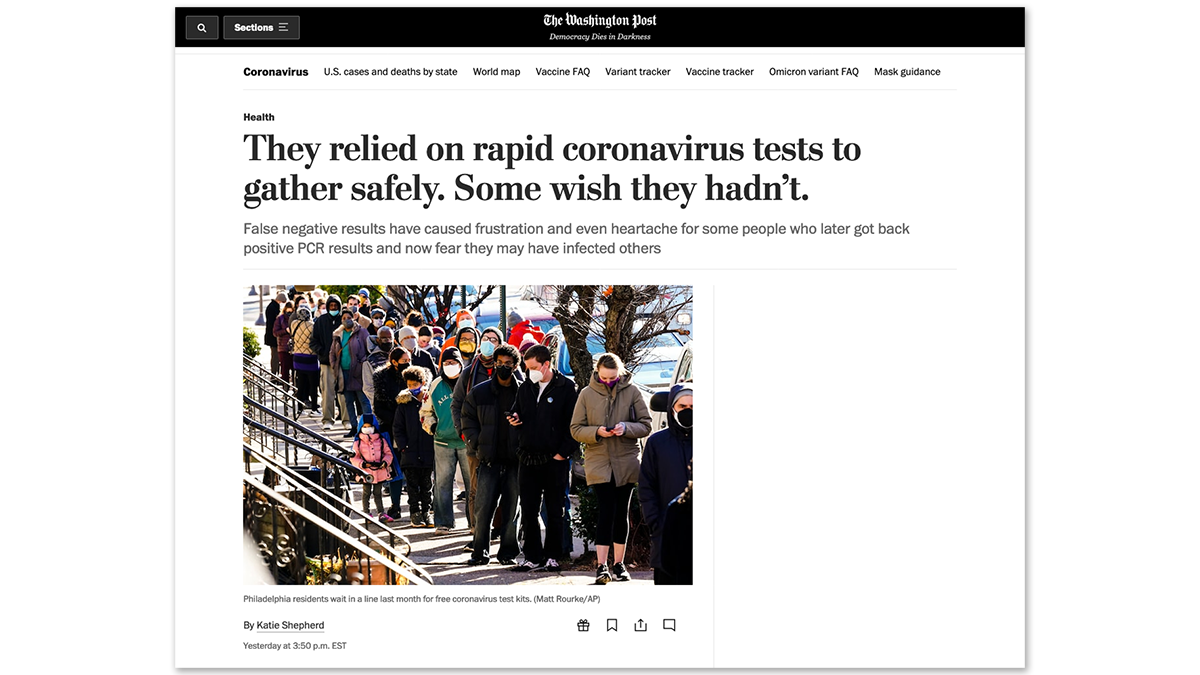With questions swirling about the accuracy of at-home Covid-19 tests during the omicron wave, researchers at Emory University and Georgia Tech are working to evaluate existing rapid tests to see how well they detect this latest variant of the coronavirus.
Wilbur Lam’s Atlanta Center for Microsystems Engineered Point-of-Care Technologies (ACME-POCT) has been testing coronavirus tests since April 2020, when the team was tapped by the National Institutes of Health. Lam told the Washington Post January 17 that the team is looking again at all the existing rapid tests to see how well they detect omicron infections. And he said two new tests that should be available soon “perform really well.”
“Help is on the way,” Lam told Washington Post reporter Katie Shepherd. Lam is a physician and professor in the Wallace H. Coulter Department of Biomedical Engineering at Georgia Tech and Emory University and the Department of Pediatrics at Emory. He explained how at-home rapid tests work and why they might be having trouble with omicron infections compared to the gold-standard polymerase chain reaction (PCR) tests performed in labs.
Lam explained that each antigen test uses different lab-made antibodies, which “act like glue to ‘capture’ and detect virus,” and some are better at detecting omicron than others. He said his lab has been evaluating all of the existing tests, including the new ones from Roche and Siemens, to see how they stack up against the omicron variant.
“It happens that these two new tests have very good antibodies that ‘stick’ very well to the virus, likely better than the antibodies of other tests on the market,” Lam added.
Consumers will be able to purchase Roche tests beginning in late January, spokeswoman Michelle A. Johnson said in an email. A Siemens spokesman said it is too early to say when its tests will reach stores, but production is ramping up. Both companies are expected to produce tens of millions of at-home test kits each month, helping to boost the nation’s supply.
Lam said that when the omicron variant first reached the United States, he and his colleagues used inactivated virus samples to test all of the rapid tests on the market. All performed well. But when they began evaluating the tests against live samples of omicron, some of the tests appeared to be less sensitive to the variant.
“There could be a bunch of different reasons for this,” Lam said.
Some substrains of the variant may produce less of the antigen that the tests are designed to detect. And differences among patients — their vaccination status, severity of infection and how long they’ve had symptoms — may also affect how well the tests work.
“All these things are still theoretical,” Lam said of the early findings. “And we just need to do more rigorous testing.”
– Washington Post
Lam said the Roche and Siemens tests aren’t necessarily any better at detecting omicron than tests already on the market, but they were the first through his team’s new testing protocols — and the first part of the 500 million at-home tests President Joe Biden pledged in December to make available.
“So, it’s great news that they work against omicron,” he said. “However, we’re now quickly and rigorously testing the other tests that are already on the market against omicron.”
Lam said his teams also are gathering additional data at their clinical collection sites to better understand where and when omicron lives in the body — a response to anecdotal reports online and in the news that some people have gotten better test results by swabbing their throat or both their nose and throat.
Latest BME News
Jo honored for his impact on science and mentorship
The department rises to the top in biomedical engineering programs for undergraduate education.
Commercialization program in Coulter BME announces project teams who will receive support to get their research to market.
Courses in the Wallace H. Coulter Department of Biomedical Engineering are being reformatted to incorporate AI and machine learning so students are prepared for a data-driven biotech sector.
Influenced by her mother's journey in engineering, Sriya Surapaneni hopes to inspire other young women in the field.
Coulter BME Professor Earns Tenure, Eyes Future of Innovation in Health and Medicine
The grant will fund the development of cutting-edge technology that could detect colorectal cancer through a simple breath test
The surgical support device landed Coulter BME its 4th consecutive win for the College of Engineering competition.








